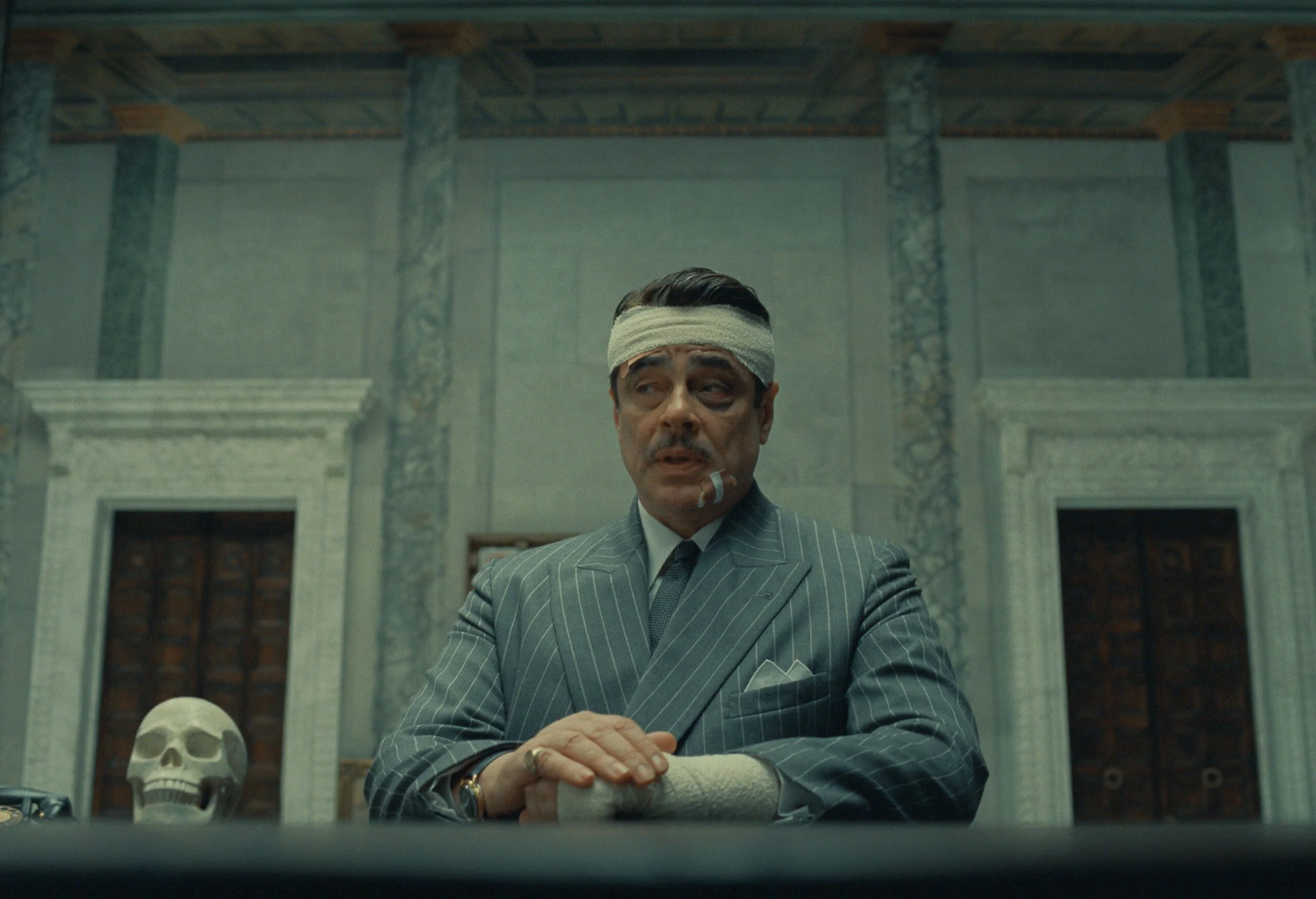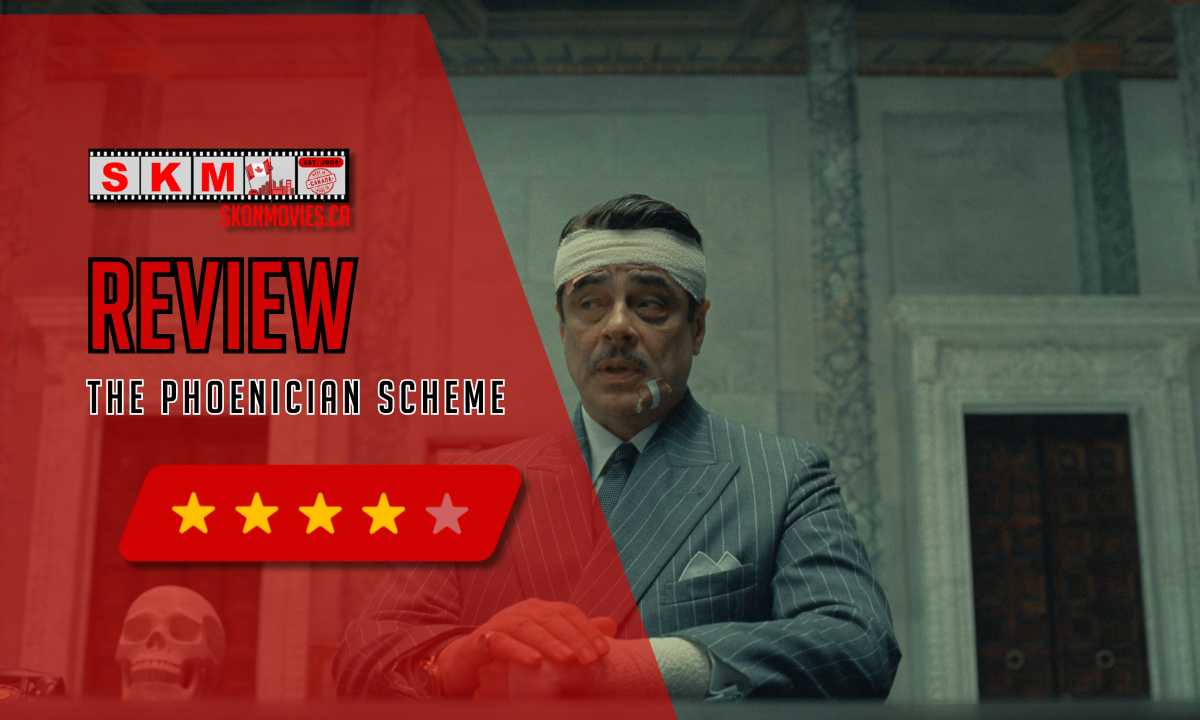The Phoenician Scheme
A wealthy industrialist avoids repeated assassination attempts while trying to close a gap in the funding of his many projects in The Phoenician Scheme. Anatole “Zsa-Zsa” Korda (Benicio Del Toro) is an industrialist and arms dealer in 1950s Phoenicia. Zsa-Zsa has miraculously survived the latest of many assassination attempts and attempts to improve his relationship with his daughter Liesl (Mia Threapleton) and makes her his heir (and a trial basis), even though she is studying to become a nun.
A consortium headed by Excaliber (Rupert Friend) fixes the price of core building materials, creating a gap in the funding of Zsa-Zsa’s Phoenician building projects. This results in Zsa-Zsa travelling with Liesel and tutor-turned-assistant Bjorn (Michael Cera) to try and close the gap with his many investors, including Prince Farouk (Riz Ahmed), brothers Leland (Tom Hanks) and Reagan (Bryan Cranston), nightclub owner Marseille Bob (Mathieu Amalric), Second Cousin Hilda (Scarlett Johansson), and Uncle Nubar (Benedict Cumberbatch).

The Phoenician Scheme Synopsis
Fresh after winning the Best Live Action Short Film Oscar last year for his adaptation of Roald Dahl’s The Wonderful Story of Henry Sugar, Wes Anderson returns with his latest feature film, The Phoenician Scheme. The film stars Benicio del Toro, who previously appeared in Anderson’s The French Dispatch, as the film’s protagonist, Zsa-Zsa Korda, a wealthy industrialist and arms dealer, who always narrowly escapes multiple assassination attempts. These attempts are usually followed by Ingmar Bergman-like black and white sequences, where Zsa-Zsa is on trial in the afterlife, featuring cameos by Wes Anderson regulars, such as Willem Dafoe, F. Murray Abraham, and Bill Murray, playing God.
The main plot involves Zsa-Zsa trying to improve relations with his daughter Liesel, played by newcomer Mia Threapleton, the daughter of Kate Winslet and Jim Threapleton. They are joined by the insect-loving tutor Bjorn, played by a scene-stealing Michael Cera, who is made Zsa-Zsa’s new assistant, the old one having been blown in half by a bomb in the first five minutes. The three visit the investors of Zsa-Zsa’s many Phoenician projects to try and close the gap caused by a price-fixing scheme.
My Thoughts on The Phoenician Scheme
There seemed to have come a point in recent years when the films of Wes Anderson seemed to be more about his distinctive visual style than the narratives themself. After peaking more than a decade ago with films such as Moonrise Kingdom and The Grand Budapest Hotel, Anderson’s later films, Isle of Dogs, The French Dispatch, and Asteroid City, were fine, but often just came and went. However, The Phoenician Scheme is arguably the first film since The Grand Budapest Hotel to be a truly fun romp from Wes Anderson.
One of the reasons that The Phoenician Scheme works so well is the charisma of Benicio Del Toro in the lead role of Zsa-Zsa Korda, who is undoubtedly the best protagonist in a Wes Anderson film since Ralph Fiennes‘s M. Gustave in The Grand Budapest Hotel. Also similar to the 2014 film, The Phoenician Scheme serves as an introduction for a new young actor, in this case being Mia Threapleton, who I thought was quite good as Liesel, even before realizing she is the daughter of Kate Winslet. Then there is Michael Cera, who proves himself as the perfect fit for a Wes Anderson film as the Norwegian-accented Bjorn.
As has been the case for Wes Anderson’s films in recent years, The Phoenician Scheme features appearances from the director’s growing ensemble of actors. This includes the return of Bill Murray, who has been collaborating with Wes Anderson since 1998’s Rushmore, who gets to make an appearance as God, after Murray had to miss out on Asteroid City. Some other returning faces include The Wonderful Story of Henry Sugar lead Benedict Cumberbatch, sporting some mighty crazy eyebrows, as the antagonistic Uncle Nubar, Tom Hanks and Scarlett Johansson returning from Asteroid City, and multi-film alumni Jeffrey Wright, Willem Dafoe, and F. Murray Abraham, among others.
At this point in his career, the very symmetrical visual style of Wes Anderson is take it or leave it. However, The Phoenician Scheme combines these visuals with a very engaging story that is arguably his best in years. I also like how the film all but shrugs off the very violent moment in the opening minutes.

